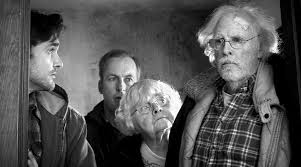By Armond White
By shooting his new film Nebraska in black and white, writer-director Alexander Payne reveals his phoniness. The contemporary-set story about an old man, Woody Grant (Bruce Dern) who travels from Montana to claim a Publisher’s Clearing House prize in the neighboring state Nebraska, has that stark, sad look of the lonesome highway that decorated Bruce Springsteen’s 1982 album Nebraska. Payne is after the same bleak-chic but while Springsteen’s ersatz-folkie concept was a near-masterpiece through emotional sincerity, Payne plays a hipster game of sophisto superiority. This is not chic, merely cheek.
 You’d never know from the look of Nebraska that Payne grew up in the American Midwest. The imagery (photographed by Phedon Papamichael who gave splendor to Wim Wenders’ The Million Dollar Hotel) is so stylized it is distant from American external reality and the combination of open-air space and strip-mall banality results in unmistakable condescension.
You’d never know from the look of Nebraska that Payne grew up in the American Midwest. The imagery (photographed by Phedon Papamichael who gave splendor to Wim Wenders’ The Million Dollar Hotel) is so stylized it is distant from American external reality and the combination of open-air space and strip-mall banality results in unmistakable condescension.
Payne hates the place but loves to return to it (in Election, About Schmidt) to confirm his contempt for its people. Nebraska is full of art-movie conceits—starting with a protagonist whose name reverses the painter of the iconographic portrait American Gothic—designed to make Manhattan-to-L.A. viewers feel superior. Every billboard is dilapidated, every storefront is pathetic: “Collette’s Beauty Salon,” “Sodbusters” and “Blinker’s Tavern” where the inevitable karaoke scene takes place.
Nebraska ridicules “folksiness.” Papamichael’s B&W doesn’t evoke Old Hollywood warmth as Peter Bogdanovich and Lazslo Kovacs did in Paper Moon; it’s a gloss placed over the frustrations of ex-urban WASP Americans, all shown to be petty, fussy, ornery yet simple-minded. When they gather to watch a game on TV, Payne neglect interest in the game, the companionship, even the technology of the (50-inch, HD flat screen technology?) television; he just assumes they’re idiot-box zombies. Woody Grant’s selfishness and greed makes his road trip solipsistic, despite sharing close-quarters with his youngest son David (Will Forte) who escorts him—it’s an escape from his squat, craggy, profane wife Kate (June Squibb). The journey into Woody’s past (like Professor Borg’s in Wild Strawberries) exposes old friends and family as enemies.
But Payne’s strange process of mockery—presenting personality quirks as character flaws (there’s a difference)—is reprehensibly cynical. It recalls Billy Wilder’s method of turning everyone except his heroes into rubes, rogues or suckers. As Wilder proved, this can lead to a successful career by confusing audience’s own nervousness and insecurity and letting them turn on their peers. That’s the discomforting basis of Nebraska—Woody, David and Kate are so self-loathing they irritate each other (a father-son Odd Couple) and become preemptive with everyone around them. Woody and David’s visit to Mount Rushmore is smirky, not the moment of shared family temperament like Barbra Streisand and Seth Rogen visiting the Grand Canyon in The Guilt Trip. Maybe Payne should attempt female/maternal empathy for a change.
Payne has achieved an odd status as the most judgmental among the American Eccentrics directors; he uses his urbane posture against middle-class characters who don’t share his savvy. It’s a warp of Preston Sturges’ humanism; Payne would never be this condescending toward characters who inhabited Manhattan or Los Angeles, the meccas of “sophistication.” Instead, Payne scores points against fly-over states, then sentimentalizes their pathetic plainness. His imitation Edward Hopper anomie is not chic, just cheek. Worse than cornball; it’s fake and hateful.
Nebraska doesn’t show true American eccentricity (the various kinds of individuality and warmth seen in Paul Mazusky’s Old Man on the Road movie Harry & Tonto). Payne’s affectation (the defect of pseudo-class progress familiar among artist who attain some level of prominence then disdain/sentimentalize their humble beginnings) poisons his conceit. By casting Bruce Dern, once a reliably unprepossessing character-actor, Payne vacates his own creation. Dern is too right to play an unlikable character (awards-jockies are pretending he has Jack Nicholson’s gravitas) and the other performers don’t pass the believability test–particularly non-actress June Squibb as Kate, Woody’s salty-tongued wife. (Only an out-of-touch Upper West Side Manhattan audience would laugh at Kate’s cuss-words or flashing her panties at a gravesite.) These phony, lifeless stereotype performances are exactly the characterizations Payne’s fakery deserves. I haven’t stepped into a movie this inauthentic since Mud.
Follow Armond White on Twitter at 3xchair
